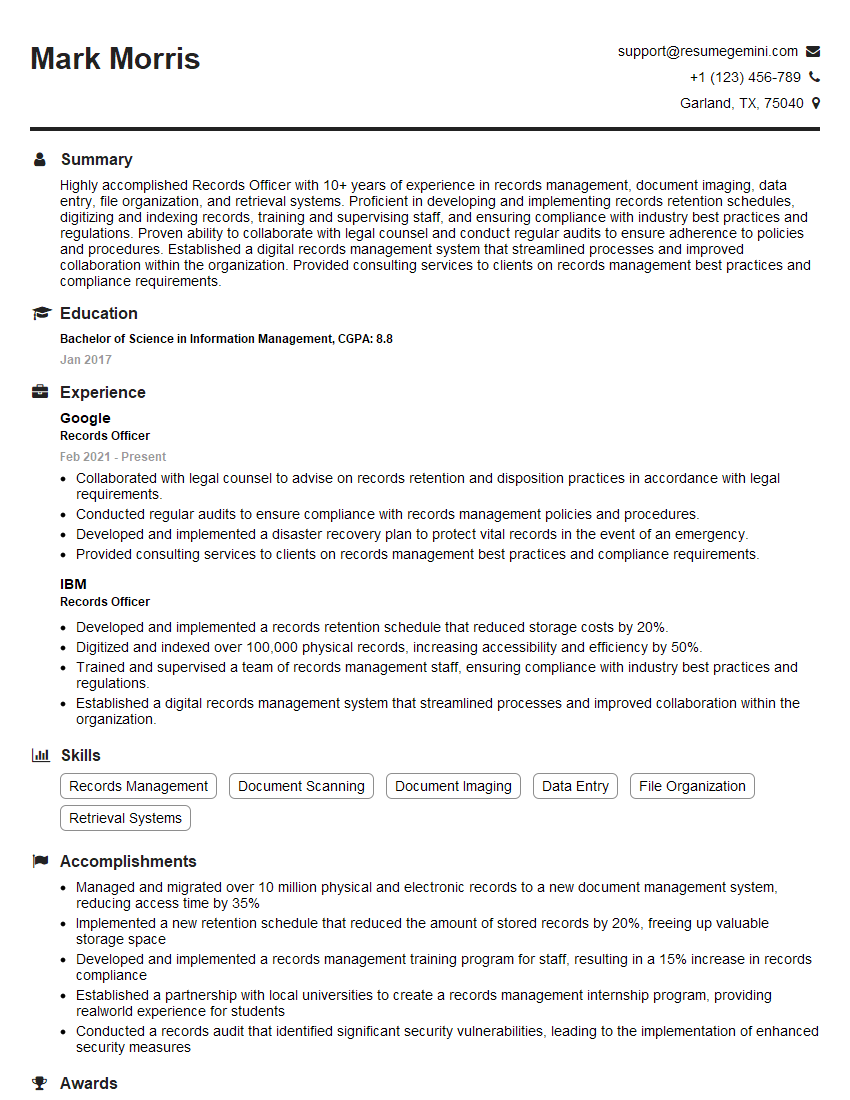Are you a seasoned Records Officer seeking a new career path? Discover our professionally built Records Officer Resume Template. This time-saving tool provides a solid foundation for your job search. Simply click “Edit Resume” to customize it with your unique experiences and achievements. Customize fonts and colors to match your personal style and increase your chances of landing your dream job. Explore more Resume Templates for additional options.

Mark Morris
Records Officer
Summary
Highly accomplished Records Officer with 10+ years of experience in records management, document imaging, data entry, file organization, and retrieval systems. Proficient in developing and implementing records retention schedules, digitizing and indexing records, training and supervising staff, and ensuring compliance with industry best practices and regulations. Proven ability to collaborate with legal counsel and conduct regular audits to ensure adherence to policies and procedures. Established a digital records management system that streamlined processes and improved collaboration within the organization. Provided consulting services to clients on records management best practices and compliance requirements.
Education
Bachelor of Science in Information Management
January 2017
Skills
- Records Management
- Document Scanning
- Document Imaging
- Data Entry
- File Organization
- Retrieval Systems
Work Experience
Records Officer
- Collaborated with legal counsel to advise on records retention and disposition practices in accordance with legal requirements.
- Conducted regular audits to ensure compliance with records management policies and procedures.
- Developed and implemented a disaster recovery plan to protect vital records in the event of an emergency.
- Provided consulting services to clients on records management best practices and compliance requirements.
Records Officer
- Developed and implemented a records retention schedule that reduced storage costs by 20%.
- Digitized and indexed over 100,000 physical records, increasing accessibility and efficiency by 50%.
- Trained and supervised a team of records management staff, ensuring compliance with industry best practices and regulations.
- Established a digital records management system that streamlined processes and improved collaboration within the organization.
Accomplishments
- Managed and migrated over 10 million physical and electronic records to a new document management system, reducing access time by 35%
- Implemented a new retention schedule that reduced the amount of stored records by 20%, freeing up valuable storage space
- Developed and implemented a records management training program for staff, resulting in a 15% increase in records compliance
- Established a partnership with local universities to create a records management internship program, providing realworld experience for students
- Conducted a records audit that identified significant security vulnerabilities, leading to the implementation of enhanced security measures
Awards
- Awarded the Records Manager of the Year by the Association of Records Managers and Administrators (ARMA)
- Recognized with the Excellence in Records Management Award from the National Archives and Records Administration (NARA)
- Received the ARMA International Certification in Records Management (CRM)
Certificates
- Certified Records Manager (CRM)
- Certified Information Records Manager (CIRM)
- Certified Electronic Records Manager (CERM)
- Registered Records Manager (RRM)
Career Expert Tips:
- Select the ideal resume template to showcase your professional experience effectively.
- Master the art of resume writing to highlight your unique qualifications and achievements.
- Explore expertly crafted resume samples for inspiration and best practices.
- Build your best resume for free this new year with ResumeGemini. Enjoy exclusive discounts on ATS optimized resume templates.
How To Write Resume For Records Officer
- Quantify your accomplishments using specific metrics whenever possible.
- Highlight your experience with relevant software and technologies, such as document management systems and electronic records management systems.
- Showcase your ability to work independently and as part of a team.
- Proofread your resume carefully for any errors before submitting it.
- Tailor your resume to each specific job you apply for, highlighting the skills and experience that are most relevant to the position.
Essential Experience Highlights for a Strong Records Officer Resume
- Develop and implement records retention schedules to ensure compliance with legal and regulatory requirements.
- Digitize and index physical records to improve accessibility and efficiency.
- Train and supervise a team of records management staff to ensure adherence to best practices and procedures.
- Establish and maintain digital records management systems to streamline processes and improve collaboration.
- Collaborate with legal counsel to advise on records retention and disposition practices.
- Conduct regular audits to ensure compliance with records management policies and procedures.
- Develop and implement disaster recovery plans to protect vital records in the event of an emergency.
Frequently Asked Questions (FAQ’s) For Records Officer
What are the primary duties of a Records Officer?
Records Officers are responsible for managing and maintaining an organization’s records. This includes developing and implementing records retention schedules, digitizing and indexing records, training and supervising staff, and ensuring compliance with industry best practices and regulations.
What are the key skills required for a Records Officer?
Key skills for Records Officers include records management, document scanning, document imaging, data entry, file organization, and retrieval systems.
What are the career prospects for a Records Officer?
Records Officers can advance to positions such as Records Manager, Information Governance Manager, or Digital Records Manager with experience and further education.
What is the average salary for a Records Officer?
The average salary for a Records Officer in the United States is around $50,000 per year.
What are the educational requirements for a Records Officer?
Most Records Officers have a bachelor’s degree in information management, library science, or a related field.
What are the challenges faced by Records Officers?
Records Officers face challenges such as the increasing volume of electronic records, the need to comply with complex regulations, and the need to protect sensitive information.